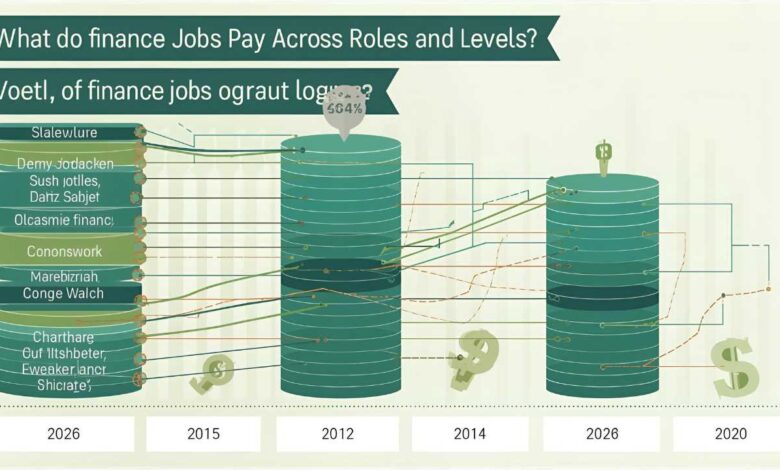What Do Finance Jobs Pay Across Roles and Levels

Jobs in finance have historically been linked to attractive benefits, competitive bonuses, What do finance jobs pay and high salaries. However, is the overall pay as high as it is frequently depicted in media and films? The truth is a little more complex.
From investment bankers and financial analysts to risk managers and personal financial advisors, the finance industry in today’s economy offers a wide range of positions, each with varying earning potential based on experience, education, location, and industry specialization. What will the real salaries for finance positions be in 2025? Let’s dissect it.
Understanding the Landscape of Finance Careers
There is more to the finance sector than multimillion-dollar deals and Wall Street power suits. Retail banking, hedge funds, insurance, and fintech startups are all included in this wide-ranging field. It’s crucial to realize that, depending on the position, “finance” can mean very different things before delving into specific pay ranges.
In addition to demanding work schedules and fierce competition, some finance positions offer six-figure base pay and substantial bonuses. Others provide moderate pay but a more balanced work-life experience. There is room for a wide range of skill levels and personality types due to the diversity of career paths; the pay will also vary greatly depending on the path you take.
Average Salaries in Common Finance Roles
Let’s examine the salaries of various finance professionals in 2025 in more detail. A comprehensive table comparing entry-level and experienced salaries for a number of common roles in the finance industry can be found below.
Table: Average Salaries for Common Finance Jobs in 2025
| Job Title | Entry-Level Salary (USD) | Mid-Level Salary (USD) | Senior-Level Salary (USD) | Bonus Potential |
| Financial Analyst | $62,000 | $85,000 | $110,000 | Moderate (10–20%) |
| Investment Banker | $95,000 | $140,000 | $250,000+ | Very High (50–150%) |
| Certified Public Accountant (CPA) | $60,000 | $78,000 | $100,000+ | Low to Moderate (5–15%) |
| Risk Manager | $75,000 | $105,000 | $150,000+ | Moderate (10–20%) |
| Financial Advisor | $50,000 | $80,000 | $120,000+ | High (Commission-based) |
| Portfolio Manager | $85,000 | $130,000 | $200,000+ | Very High (Performance-based) |
| Compliance Officer | $65,000 | $95,000 | $135,000 | Low to Moderate (5–10%) |
Depending on the company and the market, compensation in financial centers like New York City, San Francisco, or Chicago can range from 20% to 50% higher than these figures, which represent national averages in the United States. Professionals with prestigious degrees (such as an MBA from a top 10 university), certifications (like CFA or CPA), or specialized experience also frequently fetch higher salaries.
Factors That Influence What do Finance Jobs pay Salaries
Even though the role itself has a significant impact on pay, there are other factors that can raise or lower compensation. Let’s examine the most crucial elements.
Experience and Seniority
It should come as no surprise that people with more experience tend to make more money. An entry-level analyst at a commercial bank, for example, might begin at $60K, but after five to ten years of experience and a promotion to senior analyst or vice president, that amount could double or triple.
Geographic Location
The cost of living and local demand have a significant impact on salaries. For instance:
- The highest finance salaries are found in New York City, NY, but living expenses are also high there.
- Charlotte, North Carolina: A burgeoning banking center with affordable costs and competitive wages
- Chicago, IL: Prominent for commercial and investment banking
- High salaries for fintech and venture capital jobs in San Francisco, CA: High fintech and VC job salaries
Industry Subsector
There are many different subsectors within the large finance sector. Here’s a brief overview:
- Investment banking: incredibly lucrative, long hours
- High base plus performance bonuses for asset management
- Stable but lower pay in retail and commercial banking
- Fintech: Competitive pay, particularly when stock options are included
- Consistent pay with good benefits in insurance and actuarial
Education and Certifications
The following credentials can significantly boost earning potential:
- Master of Business Administration (MBA) programs from prestigious universities
- Chartered Financial Analyst (CFA): Particularly in equity research and asset management
- Certified Public Accountant (CPA): Required for positions in accounting and auditing
- Financial Risk Manager, or FRM: pertinent to risk and adherence
- Employees who combine formal education, pertinent certifications, and practical experience are frequently rewarded by their employers.
Company Size and Prestige
Well-known companies like Morgan Stanley, JPMorgan, and Goldman Sachs frequently pay more than smaller banks or regional businesses. Boutique companies, however, might provide better work-life balance or quicker advancement.
Bonuses and Perks: The Hidden Side of Finance Compensation
Pay is only one aspect of the situation. In the finance industry, bonuses can occasionally surpass base pay. Investment bankers, for instance, frequently receive year-end bonuses that are at least as high as their base pay; at the VP and MD levels, these bonuses can occasionally be double or triple.
Common Bonus Types Include:
- Performance bonuses are determined by both individual and corporate performance.
- Bonuses for signing: For competitive positions or job changes
- Bonuses for Retention: To prevent top performers from departing
- Equity & Stock Options: prevalent in hedge funds and fintech
Additional Perks Can Include:
- generous 401(k) matches
- Tuition reimbursement for degrees and certifications
- Paid sabbaticals or additional vacation time
- Wellness stipends, on-site gyms, and catered meals
Is the Money Worth the Lifestyle?
Stress, long hours, and fierce competition are common costs associated with finance jobs. Eighty-hour work weeks are common in investment banking, particularly for analysts and associates. On the other hand, although they pay a little less, positions in risk management or financial planning provide better work-life balance and more manageable hours.
Personal priorities must be taken into account. Would you be prepared to exchange time for cash? Or would you rather have a manageable workload and a consistent, sustainable income?
Tips to Maximize Your Earnings in Finance
- The following are some doable strategies to increase your income in a finance career:
- Early on, aim for certifications such as CFA, CPA, or FRM.
- Make a lot of connections because many jobs come through them.
- Select industries with rapid growth, such as private equity or fintech.
- Work in one of the major financial centers (NYC, SF, Chicago, London).
- Make use of lateral moves; switching employers can result in significant salary increases.
- Think about returning to school to earn a specialized master’s degree or an MBA.
Wrapping Up
“What do finance jobs pay?” has no one-size-fits-all solution, but hopefully you’ve seen how varied the finance industry is in terms of pay by now. There is opportunity to advance—and make money—in almost every aspect of this industry, whether you’re interested in the high-stakes world of investment banking or are thinking about a more balanced career path in financial planning.
Finance can provide not only a good salary but also long-term stability and prestige if you’re motivated, analytical, and willing to keep improving your abilities. Just keep in mind that compensation isn’t everything. Think about your individual objectives, ideal way of life, and enthusiasm for the work itself.
Q&A: Frequently Asked Questions About Finance Job Salaries
Which position in finance pays the most?
A. The highest-paying positions in finance are usually managing directors of investment banking, hedge fund managers, and private equity partners; their combined yearly compensation (bonus + salary) frequently exceeds $1 million.
Does earning a good living in finance require an MBA?
A. No, but it is beneficial. Even though many high earners, especially those from prestigious universities, hold MBAs, some people are successful with only a bachelor’s degree and a lot of experience. In many positions, certifications like CFA or CPA can also be used in place of advanced degrees.
What is the actual income of investment bankers?
A. Base pay for entry-level analysts ranges from $95,000 to $120,000, with bonuses potentially increasing total pay to $150,000 to $200,000. Depending on the deals they close, senior bankers (VPs, MDs) frequently make between $500K and $1 million or more a year.
In 2025, will a career in finance still be profitable?
A. Definitely. Even with market fluctuations, finance is still one of the most lucrative professions, particularly for individuals with the appropriate combination of training, aptitude, and drive.
Which credentials have the biggest impact on finance salaries?
A. While the CPA is essential in accounting and audit, the CFA is particularly useful in investment management and research. FRM supports risk management positions. Over time, any of these could increase your pay by $10,000 to $30K or more.

